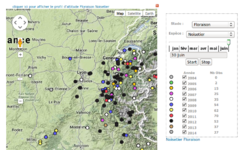Phénoclim
Cs Portal > List of citizen science projects > Phénoclim - (2014/03/26)
IDENTIFICATION
- Beta start date : N/A
- End date :
- Natural sciences > (environment/climate)
- Others in the same subject areas: Air Quality with Biomarkers, Andromeda Project, Bat detective, Budburst... further results
- Others projects about environment/climate: Budburst, GeoTag-X, Old weather, WideNoise
⇳ Description "Pheno" as in Phenology: Phenology is the study of seasonal events in habitats. As part of the Phenoclim program we follow the dates of bud-break, flowering and leaf development in the spring; color change and leaf-fall in autumn. Ten species of trees and plants are studied in our area: downy birch, silver birch, ash, hazel, lilac, colt's foot, rowan, primrose, larch and spruce.
"Clim" as in Climate: The Alps are a climate zone of particular interest in the study of climate change since the increase in temperature in this area in the last century was 1.4 degrees as compared to 0.7 degrees worldwide.
Also, the great diversity of microclimates determined by altitude and slope aspect makes this area a particularly rich area of study. A network of Phenoclim temperature stations has been placed at key points throughout the massif. ➠ Purpose The seasonal rhythms of living things, especially plants, are entirely dependent on temperature. If the spring temperature is a few degrees higher than normal, plants can begin budding and flowering several weeks earlier than usual. These events can therefore be valuable indicators of the impact of climate change on vegetation. This is what is at stake in the Phenoclim program. ? Research question
TEAM
Chamonix, France
Project team page http://www.creamontblanc.org/fr/la-crea/qu-est-ce-que-le-crea/ Leader: Daphné Asse, Irène Alvarez Institution: Centre de Recherche pour les Ecosystèmes d’Altitude (CREA) Partner institutions: Contact: Daphné Asse phenoclim@creamontblanc.org
USER TASKS
CONTRIBUTION TYPE: data collection
PARTICIPATION TYPOLOGY: crowdsourcing
GAMING GENRE NONE
GAMING ELEMENTS: NONE
◉ Tasks description Phénoclim relies on a network of observers spread over all the Alpine peaks between 200 and 2200 m altitude.
- 10 plants are followed.
- 3 of each must be observed within an area of 500m, plants must be 5m a part and reach a certain size
- the site must be described using a list of characteristics
- Five events are monitored (sprouts (?), leaves, flowers, change of color, falling leaves). During these data collection periods, sites must be visited every 8 days
- For each of these events, several data must be collected ...
⤯ Interaction with objects
▣ Interface
- Data type to manipulate: observations
- interface enjoyment:
- Interface usability:
GUIDANCE
- Tutorial: ✓
- Peer to peer guidance: Somewhat
- Training sequence: Somewhat
- Individual performance: Somewhat
- Collective performance: Somewhat
- Research progress: Somewhat
❂ Feedback and guidance description
COMMUNITY
- Communication: website
- Social Network: N/A
- Member profiles:: N/A
- Member profile elements:
- Main news site:
- Frequency of project news updates: N/A
- Type of events:
- Frequency of events :
⏣ Community description
- Community size (volounteers based)
- Role:
- Interaction form:
- Has official community manager(s): yes
- Has team work N/A
- Other:
- Community led additions:
Other information
PROJECT
Url:http://www.creamontblanc.org/fr/phenoclim/presentation/
Start date:
End date:
TEAM
Official team page:http://www.creamontblanc.org/fr/la-crea/qu-est-ce-que-le-crea/
Leader: Daphné Asse, Irène Alvarez
Institution: Centre de Recherche pour les Ecosystèmes d’Altitude (CREA)
Contact: phenoclim@creamontblanc.org
Main location: Chamonix, France
PROJECT DEFINITION
Subject
Natural sciences > (environment/climate)
Description
"Pheno" as in Phenology: Phenology is the study of seasonal events in habitats. As part of the Phenoclim program we follow the dates of bud-break, flowering and leaf development in the spring; color change and leaf-fall in autumn. Ten species of trees and plants are studied in our area: downy birch, silver birch, ash, hazel, lilac, colt's foot, rowan, primrose, larch and spruce. "Clim" as in Climate: The Alps are a climate zone of particular interest in the study of climate change since the increase in temperature in this area in the last century was 1.4 degrees as compared to 0.7 degrees worldwide. Also, the great diversity of microclimates determined by altitude and slope aspect makes this area a particularly rich area of study. A network of Phenoclim temperature stations has been placed at key points throughout the massif.
Purpose.
The seasonal rhythms of living things, especially plants, are entirely dependent on temperature. If the spring temperature is a few degrees higher than normal, plants can begin budding and flowering several weeks earlier than usual. These events can therefore be valuable indicators of the impact of climate change on vegetation. This is what is at stake in the Phenoclim program.
.
ABOUT PARTICIPANT TASKS
Tasks description.
Phénoclim relies on a network of observers spread over all the Alpine peaks between 200 and 2200 m altitude.
- 10 plants are followed.
- 3 of each must be observed within an area of 500m, plants must be 5m a part and reach a certain size
- the site must be described using a list of characteristics
- Five events are monitored (sprouts (?), leaves, flowers, change of color, falling leaves). During these data collection periods, sites must be visited every 8 days
- For each of these events, several data must be collected ...
.
| Grey typology | Participation typology | Contribution type: | ||||||||||||||||||||||||||||
|---|---|---|---|---|---|---|---|---|---|---|---|---|---|---|---|---|---|---|---|---|---|---|---|---|---|---|---|---|---|---|
|
|
|
||||||||||||||||||||||||||||
| Gaming | ||||||||||||||||||||||||||||||
| Genre: | Gaming elements: | |||||||||||||||||||||||||||||
| Interface | ||||||||||||||||||||||||||||||
| Data type to manipulate: observations | interface enjoyment: Interface usability: |
Member profiles::N/A Member profile elements: |
||||||||||||||||||||||||||||
ABOUT GUIDANCE AND FEEDBACK
| Guidance | Feedback on | ||||||||||||
|---|---|---|---|---|---|---|---|---|---|---|---|---|---|
|
|
.
COMMUNITY
| Tools | News & Events |
|---|---|
|
Communication: website |
Main news site: |
| Community description | |
|
Community size (volounteers based): |
|
Other information about community:
Community led additions:
OTHER PROJECT INFORMATION
Plantes au fil des saisons CREA - 2014-03-26.png No [[has completion level::Low]
http://www.creamontblanc.org/fr/la-crea/qu-est-ce-que-le-crea/ Daphné Asse Chamonix, France phenoclim@creamontblanc.org
No
Natural sciences environment/climate The seasonal rhythms of living things, especially plants, are entirely dependent on temperature. If the spring temperature is a few degrees higher than normal, plants can begin budding and flowering several weeks earlier than usual. These events can therefore be valuable indicators of the impact of climate change on vegetation. This is what is at stake in the Phenoclim program.
Mountain areas Phénoclim Phénoclim relies on a network of observers spread over all the Alpine peaks between 200 and 2200 m altitude.
- 10 plants are followed.
- 3 of each must be observed within an area of 500m, plants must be 5m a part and reach a certain size
- the site must be described using a list of characteristics
- Five events are monitored (sprouts (?), leaves, flowers, change of color, falling leaves). During these data collection periods, sites must be visited every 8 days
- For each of these events, several data must be collected ...
data collection
crowdsourcing observations, other: Thinking: no Computing: no Sensing: yes Gaming: no
yes N/A N/A N/A N/A N/A
N/A
yes website N/A
N/A
N/A
Low
Bibliography
| BIBLIOGRAPHY |



